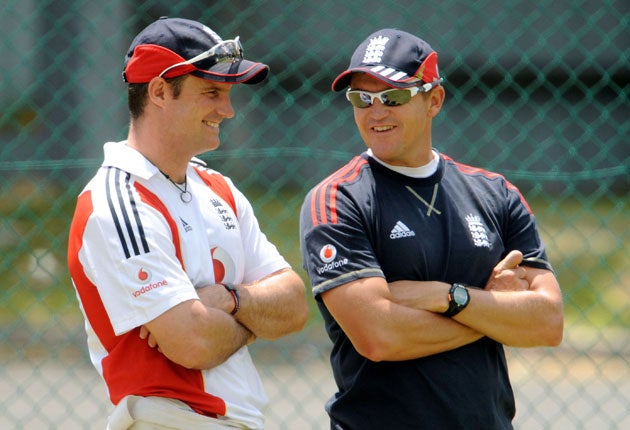How England became world beaters
The Pietersen-Moores fiasco was only a year ago but now Strauss' men are on the verge of a superb series win in South Africa and, whisper it, might just retain the Ashes. Stephen Brenkley asks the questions

Weren't England in meltdown only 12 months ago?
Yes, they were. As the differences in places go, they were in hell at this time last year and now they are residing (temporarily at least) in a sporting heaven. If the team should not have been allowed to reach the infernal depths of last January, their swift ascent to paradise has been remarkable. The full story of what happened as 2008 ended has yet to be told but it seems to have been a mere breakdown in relations between two men, the captain, Kevin Pietersen, and the coach, Peter Moores. The former simply refused to work with the latter and the latter could not see what he was doing wrong. It was a disaster and England were fortunate that they had such stable characters to fill the breach in captain Andrew Strauss and coach Andy Flower.
Are the Andys a dream team?
Strauss, it can be seen in hindsight, should have been captain two years earlier. But had that happened he might have been drubbed in Australia (as was Andrew Flintoff) and fizzled out. Yet the selectors should not be patting themselves on the back. He was always an obvious choice. It is what selectors are paid for. Flower was more of a risk because he was an appointment from within. Credit must go to the appointments panel – Hugh Morris, managing director of England cricket – for not being swayed by those who wanted him not only to trawl the rest of the world but also to pick from it, and to Flower for making a persuasive case. The job, it is easy to see, has already changed Flower. He is more cautious in his assessments, less prone to specific judgements. But he and Strauss have developed an atmosphere in which players know what is expected and are happy. The pair are not afraid to make tough decisions and recognise the virtues of patience. They have come a long way. England do not have many (any?) great players but they have the makings, no more yet, of a great team.
Can England win this series?
At 1-0 up with two to play the answer is startlingly obvious. But they have to be wary of two particular aspects: South Africa have made a habit recently of coming from behind at home, having done so against India and West Indies, and they have a magnificent record at Cape Town, venue for today's Third Test, where they have won 14 of 20 Tests since their readmission to international cricket. England, however, look like a side on the up and South Africa do not. England, partly for reasons of a settled side, partly because of a slightly worrying lack of depth, have few selection issues. South Africa, although they too have a settled side, have plenty, not least regarding their iconic fast bowler, Makhaya Ntini, who seems to be in decline. However, dropping him would be a considerable step not only because he has played 101 Tests but because he is the sole black player in a team that supposedly represents the Rainbow Nation. South Africa look weaker than they ought. But their resilience and pride should never be underestimated. It will take all England have got to prevail.
Is the balance of the side now resolved?
For the time being only. Strauss and Flower took a calculated gamble in deciding that four bowlers would be sufficient to take 20 South Africa wickets. So far it has proved correct. But the decision was based as much on the more sporting pitches as the potency of the four-man attack. The fact is that England look a more rounded team with five bowlers. The present strategy is based largely on Graeme Swann's ability to take up the slack and, admirably though he has performed, the time must come when South Africa decide to take him on. He is a confident and clever finger spinner but Swann is not a combination of Shane Warne and Wilson of the Wizard. Ian Bell, however, entirely justified the faith shown him with his fluent 140 in Durban. Maybe No 6 is his place. Scoreboard pressure, as they like to call it, is not a mirage.
So can England win the Ashes next winter?
Looking forward to the Ashes too often and for too long is definitely the curse of English cricket. But yes, they can. The Australians have a talismanic fast bowler again in Mitchell Johnson but they are patently not the team of yore as West Indies demonstrated recently. They are more fallible than they have ever been, some of their key batsmen including their wonderful captain, Ricky Ponting, are not what they were. England are still evolving. They must become tougher and they need better support players but, yes, the Ashes can be retained.
Join our commenting forum
Join thought-provoking conversations, follow other Independent readers and see their replies
Comments
Bookmark popover
Removed from bookmarks